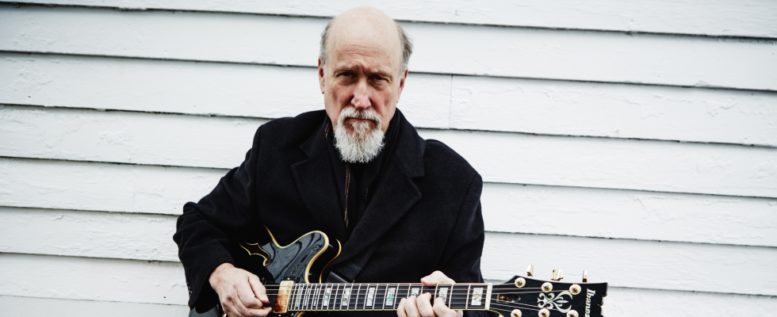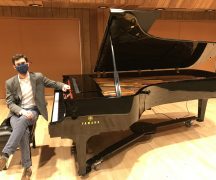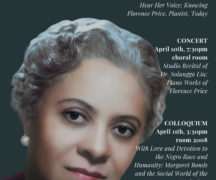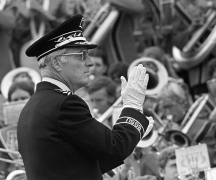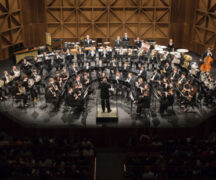By DAVID DUPONT
BG Independent News
For jazz guitarist John Scofield was coming up as a teenager in Connecticut in the late 1960s, his classrooms were the Fillmore East, the Village Vanguard and other New York City music hotspots.
His teachers were the stars on stage, Jimi Hendrix, Thelonious Monk, B.B. King, and Miles Davis.
His school bus was the train into the city and then back where his parents were waiting to pick him up at 1 a.m. the next morning. They were all maybe a little naïve, he conceded. “It was dangerous.”
But he’s survived to become part of the scene, and one of the most respected guitarists in music, playing straight-ahead and groove-based jazz. On Saturday he’ll travel to Bowling Green State University to headline the Orchard Guitar Festival.
Scofield studied guitar from the time he was 11. He studied all styles. His first love was the blues, but he didn’t see a place for himself in the blues. Instead after his guitar teacher introduced him to jazz, he headed down that path.
Yes, there was a stage band back in his high school, but “it was pretty bad.” He only knew one person in his town who played jazz, a teacher who played piano on the side.
Unlike now when jazz has become an academic subject, then it was a music of the streets.
When it came time for him to go to college, there was only one option to study jazz guitar, Berklee College of Music in Boston.
Scofield joined a long line of noted musicians for whom the school was a way station. After two years, he was working with big names including Gerry Mulligan and Chet Baker and dropped out. He headed to New York where gigs with many of his heroes awaited, including a three-year stint in the 1980s with Miles Davis.
Does he regret not getting a degree? “I never wish I had the paper. I’ve made my money playing.” Teaching doesn’t interest him. “I see young people getting degrees now because not enough playing opportunities.” Granted the “top dollar” jobs were always at a premium but “there were more opportunities to play for money back then.”
At BGSU Scofield will perform a free concert Saturday at 8 p.m. in Kobacker Hall in the Moore Musical Arts Center. Earlier in the day at 3 p.m. in Bryan Recital Hall, he’ll give master class.
In that class, he’ll share some of what he’s picked up in almost 50 years on the scene. He said he’s frequently asked particularly about what he learned from Miles Davis. “What I learned is this thing in jazz about improvising, and how great it can be, and how you’re setting yourself up to do that with other musicians in a situation where they can be the most creative they can be. That’s better than a tight, rehearsed recitation. It was wonderful to have it stated to me, not only in words, but in deeds.”
Scofield is just one of several guest guitarists at the Orchard Guitar Festival, which begins Friday, Sept. 29. Friday will featured master classes by Stephen Aron at 3:30 p.m., Craig Wagner at 4, and Fareed Haque and Goran Ivanovich at 4:30, followed by a concert at 7 featuring those four guitarists. At noon on Saturday, there will be an Electric Guitar Ensembles Concert. All these events are in Bryan Recital Hall.
Scofield will perform the Saturday concert with the jazz faculty rhythm section of Ariel Kasler, piano and electric keyboard, Jeff Halsey, bass, and Dan Piccolo, drums.
He said he’s been in touch with Kasler, who is organizing the event, and Kasler, who also plays guitar, suggested some of the guest artist’s compositions that he’d like to play. So Scofield sent along the charts. They’ll also probably play a few standards, Scofield said.
Working with a local rhythm section is a throwback to an earlier time when jazz musicians such as Sonny Stitt would tour as singles and always worked with house bands.
“It’s fun to go to a town and see the jazz scene,” Scofield said. “Now you go, and the scene’s at the university. That’s where the people who like jazz are.”
Scofield has played Bowling Green before, and not on campus. Back in April, 2002, he brought his Uberjam band for a show at Howard’s Club H.
That’s just one of the ensembles, or projects, that Scofield is part of.
The days of a group like the Duke Ellington Orchestra or the Dave Brubeck Quartet staying together for decades are gone. He may long to lead a band like that but he realizes that “I have four or five bands like that.”
Scofield has maintained a serial kind of longevity. He still performs with musicians, such as bassist Steve Swallow and drummer Bill Stewart, whom he’s worked with for “umpteen years.” Those shows are interspersed with tours with different groups of musicians with whom he has longstanding collaborations. When any aggregation comes back together after spell “you find a different slant on it which is important. You can’t keep doing the same thing.”

